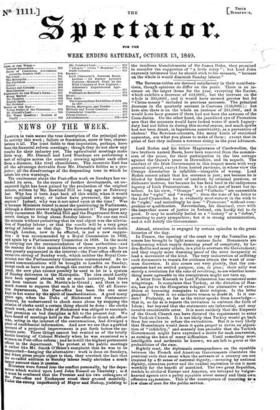NEWS OF THE WEEK.
LABOUR in vain seems the true description of the principal pub- lic activity this week ; failure or frustration, more or less, charac- terizes it all. The least liable to that imputation, perhaps, have been the financial reform meetings ; though they do not show any results for their industry yet. The agricultural meetings make little way. Mr. Disraeli and Lord Stanhope are performing a sort of eclogue across the country ; crowing against each other from a distance, like rival chanticleers. The eccentric Earl has all the advantage derivable from Mr. Disraeli's foibles as a pro- jector; all the disadvantage of the desponding tone in which he" utters his own warnings. The excitement about the Post-office work on Sundays has ex- tended its area., In the course of further developinent, an un- expectedlight hawbeen gained by the production of the original ininute,.written by M,. Howland Hill so long ago as February last. Why has it beens..kept back all this while, when it would have explained away, or rather have prevented, the miscon- ception? Indeed, why was it not,acted upon-at the time ? Was it because Ministers feared to meet the questioning in Parliament, although a direct answer mighthave silenced-it? The paper per- fectly exonerates Mr. HowlandIfill and`the Department from any covert design to bring about Sunday labour. No one can read the minute without perceiving that its real object was the allevia- tion of Sunday labour; or that the results will be a very great saving of labour on that day. The forwarding of certain mails through London, now to be effected, is not a new sugges- tion : it was recommended by a Royal Commission in 1836, and again by a Parliamentary Committee in 1838. In the mode of carrying out the recommendation of those authorities—and the reasons for it that existed thirteen or eleven years ago have been greatly augmented in the interval—the Post-office effects an extensive saving of Sunday work, which neither the Royal Com-7 mission nor the Parliamentary Committee contemplated. As no posted communications will be brought to London on -Sunday, except such as have to pass through the central office to places be- yond, the new plan cannot possibly be used to let in .a system of Sunday deliveries in the Metropolis. The idea could hardly have been spread abroad with so much industry, had there not been traitors in St. Martin's-le-Grand ; and there is too much reason to suppose that such is the ease. Of all Execu- tive departments, the Post-office has been the one most kept in hot water by theitpirit of insubordination. A good many years ago, when the Duke of Richmond was Postmaster- General, he 'endeavoured to check some abuse by stopping the salaries of clerks until a certain thing should be done : the clerks struck work, and the Duke of Richmond was obliged to succumb. That premium on bad discipline is felt to the present day. We have heard of meetings held in the Post-office to thank an officer who, acting in the interest of the contumacious, had divulged a piece of confidential information. And now we see that a garbled account of a projected improvement is put forth before the au- thentic note. These things cannot but remind us of the totally hostile bearing of Colonel Maberly when he was examined, as .a witness on Post-office reform ; and he is still the highest permanent (Geer in the department. Theprotest at the public Meetings ill rather like Mr. Smith O'Brien's complaint that he was to be transported—hanging the alternative : work is done on Sundays, and when pious people object to that, they overlook the fact that the so-called addition to Sunday labour really abolishes a antsch, larger amount than it creates. Ministers were forced into the conflict personally, by the depu- tation which waited' upon Lord John Russell on Thursday ; at. cl it ram be' confessed that the Premier and his two colleagues of the Post-office and Exchequer stood their ground manfully. Under the strong importunity of. Mayor and Bishoi,:yielding to
the insidious blandishments of Sir James Duke, they promised to consider the suggestion of "a little delay "; but Lord John expressly intimated that he should stick to his measure, " because on the whole it would diminish Sunday labour."


























